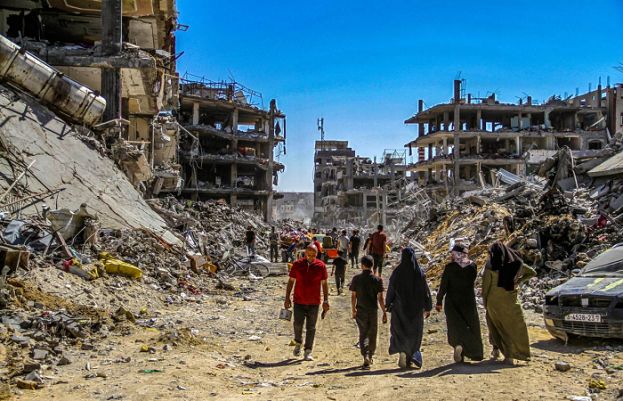Israel reaffirmed on Sunday that it will retain full control of security inside Gaza, despite agreeing to a US-mediated ceasefire that envisions the deployment of an international peacekeeping force. Prime Minister Benjamin Netanyahu told cabinet ministers that Israel alone would decide when and where to strike its enemies and which nations would be permitted to send troops to oversee the truce. “Israel is a sovereign nation. We will defend ourselves by our own means and continue to shape our destiny,” Netanyahu declared. “We seek no one’s approval for our actions. Our security remains in our hands.” AFP footage showed an Egyptian convoy entering Gaza carrying rescue personnel and heavy machinery to assist in locating the remains of Israeli hostages reportedly buried under the rubble in the war-ravaged territory. Trucks bearing the Egyptian flag and loaded with bulldozers and diggers were seen heading toward Al-Zawayda, where an Egyptian aid coordination committee is based. Israeli government spokesperson Shosh Bedrosian confirmed that Netanyahu personally authorized the Egyptian team’s entry. “This is purely a technical team none of the members are military personnel,” Bedrosian clarified. “They have been permitted to cross the IDF’s Yellow Line into Gaza to conduct searches for the missing hostages.” According to the terms of the US-brokered ceasefire, Israeli forces are to withdraw following two years of intense conflict with Hamas, while an international security contingent expected to consist largely of Arab and Muslim countries will assume responsibility for maintaining order in Gaza. However, Israel has rejected any role for Turkey in the mission. Facing mounting pressure from hardliners within his coalition for agreeing to the truce, Netanyahu struck a defiant tone during the cabinet session in Jerusalem, emphasizing that Israel alone will dictate Gaza’s future security arrangements. “We made clear with respect to international forces that Israel will determine which forces are unacceptable to us,” he said, one day after US Secretary of State Marco Rubio wound up the latest in a parade of high-level visits by Washington officials. Later, Bedrosian put it more starkly: “The prime minister has said it’s going to be done the easy way or the hard way, and Israel will have overall security control of the Gaza Strip.” “Gaza will be demilitarised and Hamas will have no part in governing the Palestinian people.” Child’s dream is gone Aid agencies complain that humanitarian convoys still do not have enough access to Gaza to alleviate the famine conditions in parts of the territory, and families there are still going hungry. AFP journalists followed the family of 62-year-old grandmother Hiam Muqdad for a day in their Gaza City neighbourhood, where they live in a tent next to their ruined home and her barefoot grandchildren gather domestic waste and twigs to burn to heat water. “When they said there was a truce, oh my God, a tear of joy and a tear of sadness fell from my eye,” Muqdad told AFP. “The child’s dream is gone. In the past they used to go to the park but today children play on the rubble.” Israel has withdrawn its forces within Gaza to the so-called “Yellow Line” but remains in control of more than half the territory, approves every UN aid convoy going through its borders and has carried out at least two strikes since the ceasefire. To underline Israel’s independence of action, Netanyahu said it had pummelled Gaza with 150 tonnes of munitions on October 19 after two of its soldiers were killed, and had conducted a strike on Saturday targeting an Islamic Jihad militant. The United States and allies have set up a truce monitoring centre in southern Israel — the Civil-Military Coordination Centre (CMCC) — and dispatched a string of top officials from President Donald Trump’s administration to promote the ceasefire. The latest Israeli strike came just as Rubio was leaving Jerusalem, but Washington’s top diplomat said he remained optimistic the ceasefire would broadly hold if Hamas agrees to disarm and hand over the rule of Gaza. Rubio told reporters that Washington did not expect the Yellow Line to become Gaza’s new border and that Israel would eventually pull back. “I think, ultimately, the point of the stabilisation force is to move that line until it covers hopefully all of Gaza, meaning all of Gaza will be demilitarised,” Rubio told reporters on his plane as he flew to Qatar. The main Palestinian factions, including Hamas, have agreed to form a committee of technocrats to administer Gaza alongside the ceasefire and reconstruction effort. But Hamas has resisted calls for its immediate disarmament and has launched a crackdown on rival Palestinian gangs and armed groups in Gaza. Hostage recovery In a statement on Sunday, Hamas’s lead negotiator Khalil Al-Hayya said the militant group’s weapons are “linked to the presence of the occupation and aggression”. He added: “If the occupation ends, these weapons will be transferred to the state.” Hamas has insisted it is serious about returning the remaining 13 hostage bodies. They include 10 Israelis kidnapped during the group’s attack on October 7, 2023 that triggered the conflict, one Israeli missing since 2014, a Thai and a Tanzanian worker. Hamas has already returned the remaining 20 living hostages and 15 bodies of hostages. But Hamas warns it will struggle to find the bodies of the others in the ruins of Gaza, where more than 68,500 Palestinians have been killed by Israeli fire, according to figures from the health ministry of the Hamas-run territory deemed reliable by the UN. Bedrosian dismissed this, telling reporters: “Hamas knows where our hostages are,” and adding the group needed to make more of an effort to retrieve the bodies.
Israel asserts control over Gaza despite ongoing truce

